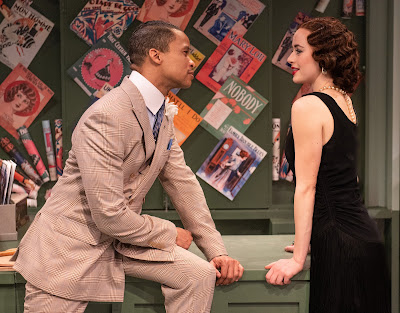By Harry Forbes
Broadway musical buffs may recollect Betty Smith’s name on the cover of the cast album as co-librettist of the 1951 musical, “A Tree Grows in Brooklyn” (based on her international 1943 best-seller). But that, in fact, was to be her only Broadway credit. And yet, Smith was apparently a prolific playwright who prized the dramatic field above all others, turning out around 70 plays. Several won prestigious prizes, but none of them received professional productions.
Just how dedicated she was to the genre is apparent in Mint Theater’s absorbing production of her 1931 play which won the University of Michigan’s renowned Avery Hopwood Award.
The play’s protagonist shares the name of the central character of “A Tree Grows in Brooklyn,” Francie Nolan, but there all similarities end. This Francie, impressively played by Emma Pfitzer Price in her Off-Broadway debut, works in a Kress five-and-dime-cent store in Brooklyn as a song plugger at the sheet music counter. A steadfastly virtuous 19-year-old who resists the myriad flirtations of the male customers much to the amused disdain of accompanying pianist Florry (entertaining Pearl Rhein with a Louise Brooks bob) who has far fewer scruples.
But when good looking, upper crust Leonard (Peterson Townsend), the son of the Kress chain’s chief (Duane Boutté), asks her out for a date, she finally lowers her guard and relents.
In the second act, we meet Francie’s lower middle-class family -- boorish policeman braggart of a father (forceful Jeb Brown), pious mother (Antoinette LaVecchia really nailing the character), tactless brothers (Tim Webb and Jack Mastrianni) -- when she brings Leonard home to meet the folks, with (slight spoiler) disastrous results.
The color-blind casting of Leonard here rather requires some temporary suspension of disbelief, as Pa Nolan makes it patently clear before Leonard walks through the door that he expects any fella Francie brings home to be Irish Catholic. As it happens, the whole family treats Leonard with amusingly fawning deference as it seems they’ve never had a well-bred gentleman in the house before.

Without revealing any plot specifics, in the third act, let’s just say that Francie shakes off her shy passivity and comes to full maturity, living up to the play’s title.
The humorous tone of the first act -- with Price skillfully warbling a handful of songs, most especially Jerome Kern’s “Left All Alone Again Blues'' from “The Night Boat” -- and engaging in light banter with the other shopgirls, gives way to some pretty heavy kitchen sink melodrama in the second (actually, quite literally, as it takes place in the Nolan kitchen), and then a serious and sobering third. Smith’s dialogue has the ring of veracity, and her feminist perspective is highly persuasive throughout, even if some of the plot turns challenge credulity.
Vicki R. Davis’s sets -- the colorful Kress Dime Store of the first act (which a program note is careful to assure us is purely fictional in all respects as the real-life Kress chain never even had a Brooklyn store), and the Nolan’s tenement kitchen in the second -- are beautifully realized on the Mint’s modest budget. Likewise, Emilee McVey-Lee’s costumes are period perfect.
Under the assured direction of Britt Berke, Price’s highly committed central performance makes us really care about Francie’s plight, and overlook some of those script improbabilities. Her transition from the passive girl of the first act to assured woman in the third is truly outstanding. And there’s marvelous work from Gina Daniels -- likable and warm -- as Francie’s workmate and neighbor Tessie, Jason O’Connell as the good-hearted ambulance driver who’s sweet on Tessie, and Boutté as Leonard’s slickly unflappable father who shares some important moments with Price in the final act.
(NY City Center Stage II, 131 West 55th Street; minttheater.org; through March 18)
Photos by Todd Cerveris:
(Top)(l.-r.) Townsend, Price
(Below)(l.-r.) Price, Daniels, Brown, LaVecchia
Print this post


0 comments:
Post a Comment